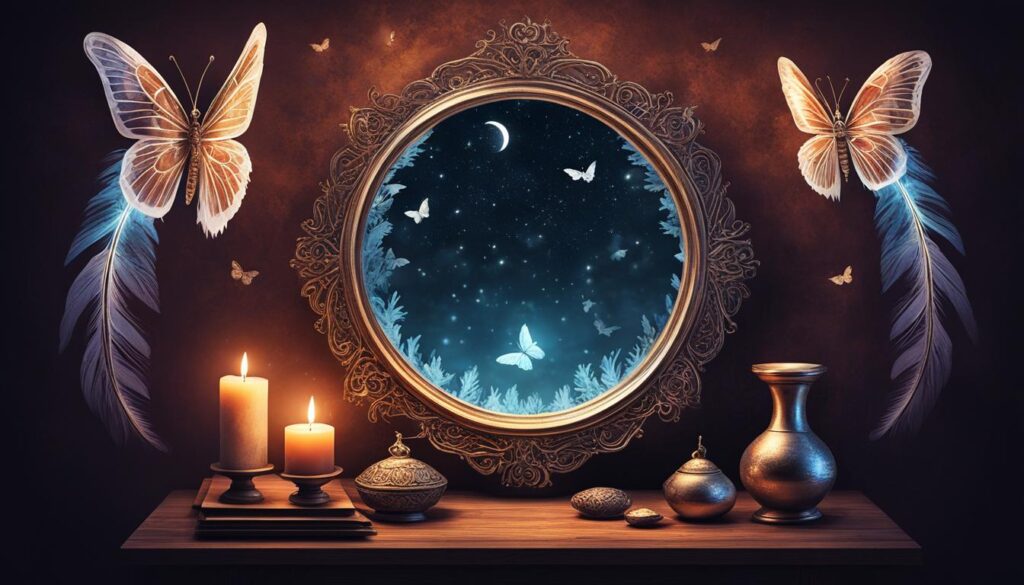Dreams have a profound way of intertwining with our emotional fabric, often presenting scenarios that evoke strong reactions and a search for greater meaning. When I encounter my deceased father in dreams, it pulls at the strings of my psyche, prompting questions and instigating a deep dive into dream analysis. The visions of a lost loved one, seemingly alive and present, can be both comforting and disconcerting, leaving me to wonder about their significance.
As someone navigating this landscape of nocturnal imagery, I lean on the pillars of dream interpretation and psychological insights to discern the nuances of these encounters. Dream symbolism, as a language of the subconscious, often holds the key to unpacking the emotions and unresolved conflicts that these dreams may represent. Through self-reflection and understanding the common themes associated with seeing a deceased father in dreams, I embark on an explorative journey to grasp the echoes of my inner world.
Dream analysis is not a one-size-fits-all process; it is deeply personal and rooted in the individual’s psyche. While the dream may portray my late father alive and partaking in the tapestry of my dream-world scenarios, there’s an undercurrent of psychological insights waiting to be discovered, offering a potential pathway to emotional closure or continued connection.
Key Takeaways
- Dreams featuring a deceased father can signify a multitude of personal emotions and psychological states.
- Interpreting dream symbolism helps uncover subconscious messages and unresolved issues.
- Understanding the role of these dreams offers insights into our grieving process and emotional healing.
- Psychological insights from dreams about loved ones can assist in coping with loss and seeking closure.
- Analyses of such dreams are deeply personalized, shaped by individual experiences and memories.
Exploring the Psychological Significance of Dreams
When I find myself dreaming of my late father as if he were still alive, I’m reminded of the intricate workings of my subconscious mind. These dreams, abundant in symbols and themes, often act as a mirror reflecting my innermost emotions and thoughts. As someone eager to understand the nuances of dream meanings, I delve into the psychological processing behind these nocturnal visions. Dream analysts suggest that such dreams might be gateways to emotional healing and grief management.
Interpreting Dream Symbols and Themes
The patterns and scenarios depicted in my dreams are not random; they are symbolic manifestations from my subconscious mind. The appearance of my deceased father, for example, can be an amalgamation of many matters – perhaps unresolved feelings or a yearning for guidance. To decode these symbols, I turn to dream dictionaries and psychological theories which offer insights into this enigmatic language of the sleeping mind.
Emotional Responses to Seeing a Deceased Loved One
The emotional waves that overtake me following dreams where my father is vividly present are a testament to the profound impact of these experiences. It’s a common phenomenon for individuals in the throes of grief. Bereavement experts affirm that our emotional responses in these moments are intense yet a natural part of the healing process, providing a silent space for honoring and remembering lost loved ones.
Understanding Dreams as a Coping Mechanism
Dreams have often been viewed as a coping mechanism, a subconscious strategy for managing grief. They can serve as a nocturnal sanctuary where the mind attempts to process loss and seek solace. In my own journey through sorrow, dreams of my father being alive often give me comfort, suggesting that even in sleep, my mind is seeking pathways toward peace and resolution.

The Cultural and Superstitious Views on Dreaming of the Deceased
As I delve into the realm of dreams, particularly those in which the deceased appear, I find that the interpretations are vast and deeply rooted in cultural heritage and superstitious beliefs. These dreams are not merely figments of the imagination but are often laden with **cultural beliefs about dreams**, infused with **superstitious interpretations**, and believed to be forms of **ancestral communications**. Some hold the conviction that there exist **spiritual meanings of dreams**, providing solace or guidance to the living.
In attempting to unravel the tapestry of cultural significances, I’ve encountered diverse perspectives. For instance, some cultures esteeming dreams as sacred messages from ancestors, while others view them as forebodings. It’s this intricate weave of beliefs that underscores how our nightly visions are perceived around the globe.
- Dreams as Forewarnings: In various societies, a visitation dream involving a deceased loved one might be seen as an omen or warning, prompting introspection or caution in wakeful life.
- Continuity of Relationships: Others may interpret these dreams as a testament to the undying bond between the living and the dead, thus offering the comfort of presence even after a loved one’s passing.
- Gateways to the Spiritual World: Some cultures hold the belief that dreams serve as a bridge to the spiritual realm, allowing the living to commune with spirits and deities.
These interpretations are not just academic musings but are interwoven with the emotional fabric of individuals who experience them. Each dream carries a weight that is interpreted through the prism of heritage and belief systems that have been passed down through generations.
“To dream of the deceased is to engage in a conversation that transcends the physical world, a dialogue steeped in the mysteries of the cosmos and the depths of the soul.” – Cultural Dreams Researcher
The complexity of deciphering dreams where the deceased come to visit is akin to understanding a language that is both personal and universal. It is seasoned with the supernatural and reflects an inheritance of ancestral wisdom and whispered legends.
| Culture | View on Dreaming of the Deceased | Common Interpretations |
|---|---|---|
| East Asian | Visits from ancestors | Guidance, approval, or disapproval from the past |
| Native American | Spiritual connection | A journey or teaching from the spirit world |
| Western | Psychological reflection | Unresolved issues or internal dialogue with oneself |
The aforestated table outlines just a fraction of the multitudinous interpretations available worldwide. As I continue to explore these nocturnal visitations, I find that the richness of our dream experiences is inexorably linked to the cultural and spiritual substrates that define our human experience.

Unearthing the full spectrum of meaning behind such vivid encounters with the deceased in dreams demands an acknowledgement of these diverse cultural lenses. It is within this framework that we can begin to appreciate and perhaps even interpret the seemingly cryptic communications that occupy our dreamscape.
Dream Dead Father Alive: Unpacking the Personal Experience
When I dream of my late father as though he has returned to life, it’s a moment drenched in significance, a collision of past affection and present loss. As I navigate my emotional journey, these dreams represent more than mere sleep-time narratives; they are a reflection of a heart seeking understanding and peace. In my quest to unpack these personal experiences, I delve into narrative analysis, sifting through common themes and the messages they may carry. Dreams like these, featuring my father alive once more, have been a profound aspect of my healing process, drawing from the depths of memory and longing.
Common Narratives and Their Interpretations
Many of us share remarkably similar stories when recounting nighttime visits from deceased parents, pointing toward universal archetypes in our search for meaning. As I reflect on dreams with my father, it becomes evident that certain scenarios repeat themselves across various personal reflections. Whether he is offering guidance, sharing a silent meal, or simply being present in ways he once was, the tapestry of dream dead father alive speaks to a collective yearning for continuity and understanding amid the rupture of grief.
The Impact of Grief and Memory in Dream Content
Grief’s imprints on my psyche surface vividly as dreams, where the tapestry of memories crafts scenarios both poignant and surreal. The interplay of past interactions and our minds’ attempt to reconcile the irreparable absence of a loved one is scarcely understood. Yet, it is in these dreams that I grasp at the essence of my father, a fleeting encounter that carries the potential to both soothe and unsettle the hard journey of mourning. This interweaving of grief and memory can sharpen the ache of loss while simultaneously offering a surreal form of solace.
Seeking Closure through Dream Encounters
In these dream encounters, there’s often an underlying pursuit for closure—a notion that perhaps within my subconscious lies the balm to ease the sharpness of his absence. These nocturnal reunions present a paradox; they’re both a reminder of loss and a conduit for healing, a place where seeking understanding can lead to an unexpected inner dialogue with the departed. While the palpable reality of waking life lacks his presence, through dreams I am able to navigate the contours of my bereavement, finding a quiet corner for contemplation and acceptance.